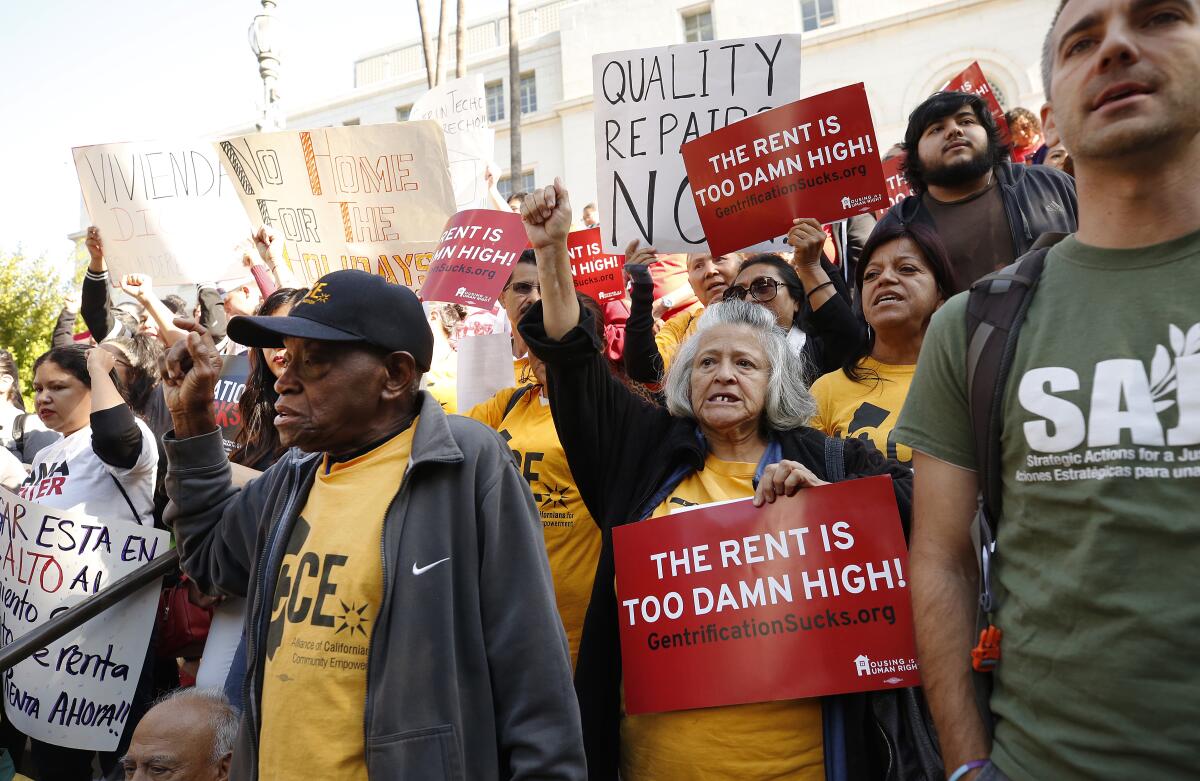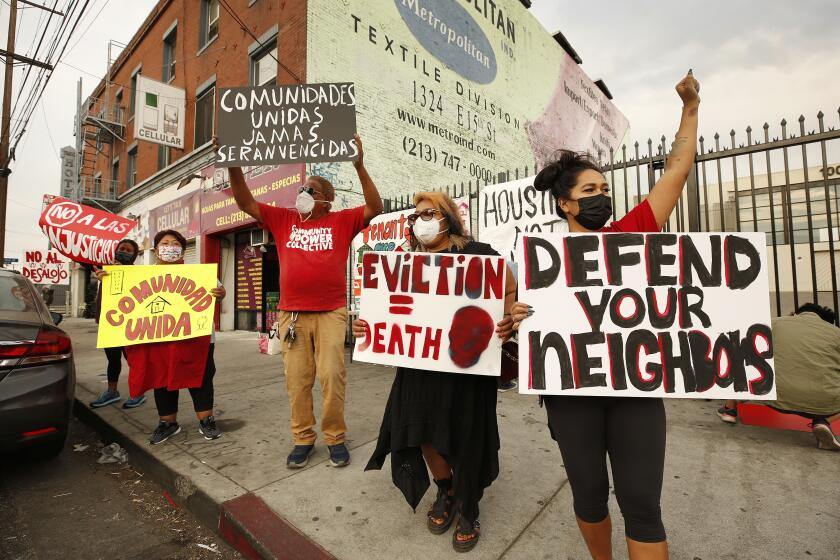California’s eviction moratorium to lift at midnight, despite rent relief concerns

- Share via
SACRAMENTO — A limited three-month extension to California’s eviction moratorium is scheduled to expire on Thursday at midnight, despite opposition from tenant advocates who say the state still hasn’t done enough to keep renters housed during the COVID-19 pandemic.
Lawmakers in March moved the eviction moratorium’s expiration date from April 1 to July 1 for California tenants who’d applied for the state’s rent relief program by the end of March. That extension also afforded the state’s Department of Housing and Community Development more time to work through a backlog of applications and disburse payments to thousands of renters who still hadn’t received aid.
Of the 404,313 household applications received, the department has so far processed 329,327, according to the state’s rent relief dashboard. The average assistance per recipient totals $11,667, and the state has paid out more than $3.8 billion in assistance.
Madeline Howard, senior attorney for the Western Center on Law and Poverty, said thousands of vulnerable Californians could lose their housing as of Friday. Howard is one of the attorneys in two lawsuits that a coalition of tenant advocacy groups brought against the Department of Housing and Community Development after it closed the application portal.
One lawsuit alleges that the state’s “flawed administration” of the rental assistance program “is violating tenants’ due process rights and disproportionately harming tenants on the basis of race, color, and national origin, leading to unnecessary evictions,” while another claims that the state isn’t covering the amount of rental debt promised by state law. The coalition is also seeking records related to the department’s denial process.
“I wish that things had gotten better,” Howard said. “The program has been deeply problematic from the beginning. ... This was a huge investment of public funds, and it could have made so much more of a difference and reached so many more vulnerable people than it did because of the way that it’s been handled.”
Evictions and rent increases still are limited in Los Angeles and many other parts of Southern California. But the rules vary from city to city.
The lifting of the moratorium marks the end of more than two years of legislative intervention to keep struggling Californians in their homes during the pandemic. The moratorium technically ended at the end of September, but landlords were able to pursue an eviction only if they applied for financial assistance for their tenant.
The state last year received a total of $5.2 billion in federal funding to set up its rent relief program. The Department of Housing and Community Development was responsible for issuing about half of that money while local governments that chose to set up their own systems doled out the rest.
But a series of bureaucratic challenges stymied the processing of applications and the state’s ability to quickly disburse relief, and the large number of applicants sought more money than what California received for its program. The state applied for an additional $1.9 billion from the U.S. Department of the Treasury to help pay for the additional requests for aid.
Spokesperson Alicia Murillo said in an emailed statement that the housing department has “improved and refined the approval review and process.” The agency stepped up outreach and worked with local organizations to assist applicants with outstanding tasks, Murillo said, and modified its application review process to ensure fraudulent submissions aren’t receiving aid.
“Keeping Californians housed has been and continues to be at the heart of our work on this program,” Murillo said.
Assemblymember Buffy Wicks, an Oakland Democrat and one of the authors of the emergency bill to extend the moratorium, said she still has some concerns about struggling renters but has been assured that “any qualifying application will get funded.” Wicks said California’s general fund can provide another funding option, if needed, and that local governments will be able to institute their own moratoriums once the state’s ends.
“I am concerned about how tenants are in California, but frankly I was concerned before COVID,” Wicks said, adding that lawmakers now need to focus even more intently on producing more affordable housing and ensuring access to it.
“That makes the broader policy work on housing even more critical,” Wicks said.
More to Read
Sign up for Essential California
The most important California stories and recommendations in your inbox every morning.
You may occasionally receive promotional content from the Los Angeles Times.














